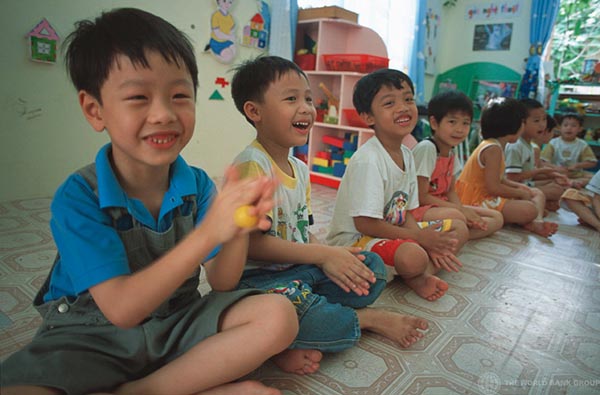
P.E.A.C.E. Projects 2023
The P.E.A.C.E. Projects is an initiative to sponsor and mentor early childhood educators, in promoting peace education for young children in the classroom.
By Jacki Breger
The original design of this project included three parts, in collaboration with several childcare centers, part of an Agency, in San Francisco. First, I would lead a singing time with children that included songs that would promote awareness of themselves and others, and develop an interest in each other’s ideas; second, the session with children would be followed by a professional development meeting with teachers to discuss their observations and concerns; third, I would lead a family community sing.
Two changes were made almost immediately. First, I was advised by the Agency that they didn’t think they could count on families to attend a sing, and so the idea was abandoned. Second, one of the Centers requested that I come for several additional sessions, working with children in the morning and teachers in the afternoon. The Agency covered the cost of the additional sessions.
A third change/addition was that the Agency hired me to do two sessions with teachers as part of their monthly, agency-wide professional development meetings. Almost immediately, the scope of the P.E.A.C.E Project was expanded way beyond the original parameters. And, as with most projects, there were successes and challenges.
The first challenge was the physical space, which is long and narrow, and in my opinion, too small for the size of the group, which I believe was about 20 children at each site. This is, in part, a function of San Francisco, where many, if not most, buildings are crammed into small, long and narrow spaces. And it really underscored the role of the physical environment in supporting and/or hindering the program. I believe the teachers and other staff at both sites did/are doing a phenomenal job to meet and rise above this challenge. But we all noticed and felt the limitations of the site for developing a focused group time.
At the Center with the additional sessions, we experimented with the time I worked with the children, and whether I would work with two smaller groups divided by age (the preference of all the adults, including me) or one large group of all the children. We still have two more sessions to “experiment.” But as of this writing, neither option has been, nor will likely be, entirely successful, due mostly size constraints.
The second challenge for me was that I realized how little I know about Chinese culture related to children and child development. One of the sites was in Chinatown, serving many Chinese families. I noticed that the children were somewhat (more than I am used to) reticent about expressing their ideas within the songs, and they seemed not to be accustomed to singing. Several times, I turned to the teachers for guidance, which they readily offered. Having said that, each time was a little easier, and the children seemed to enjoy their time with me (as did I with them).
The third challenge was parents and childrearing practices. When I asked about “home culture” the Center staff expressed their frustration regarding some of the “old world” ways and customs, and that parental expectations were not always aligned with what we know about the stages of child development.
Challenges alive and aside, we all enjoyed the actual singing time with the children. I think the children are beginning to respond, join in, offer their ideas in the songs, and may even be looking forward to my final two upcoming visits. I have noticed that they are beginning to ask for songs, and that they are noticing other children in the group when we sing about their names and/or what they are wearing.
Another success is that we have begun talking about the possibility of continuing our relationship, emphasizing staff development. We’ve also discussed the possibility of my meeting with parents to talk about some basic issues around child development, setting limits, and how the singing can help with routines at home, as well as at school.
All things considered, I think we are on our way to some very positive outcomes, certainly with children and teachers, and hopefully with parents, too. In my proposal, I wrote about the importance of singing in the development of positive relationships. While I would like to have gone farther and accomplished more, I do believe that we have begun to lay the foundation for the P.E.A.C.E. goal of “working together to create a nonviolent, just, inclusive, and respectful world.” And I am very grateful to P.E.A.C.E. for giving me the opportunity to work with these children and teachers.


Leave A Comment?